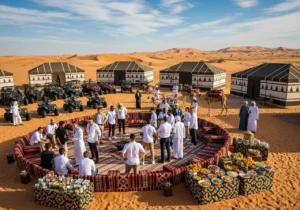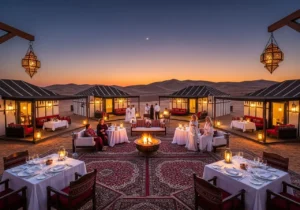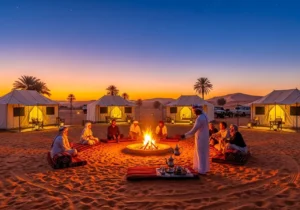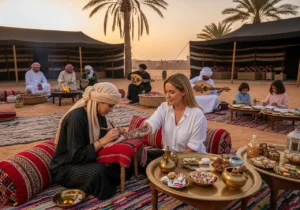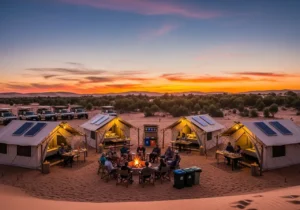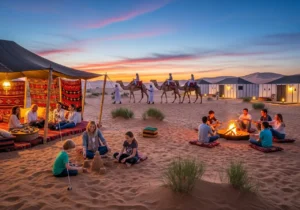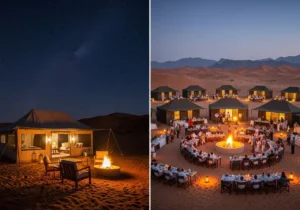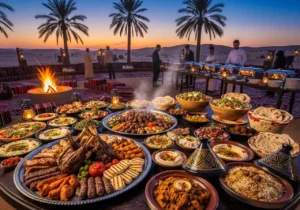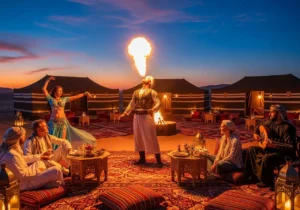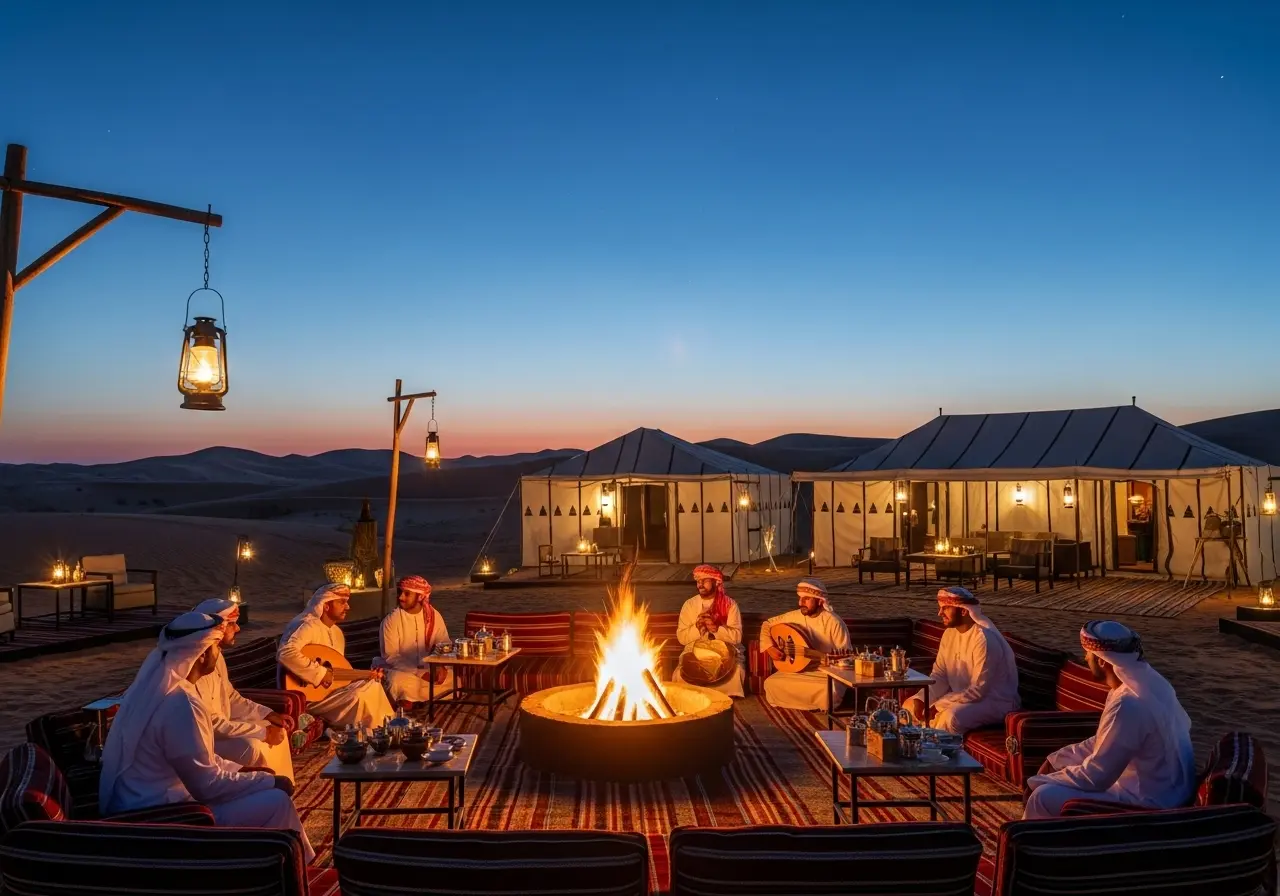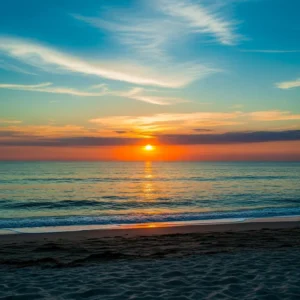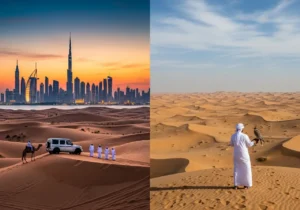The Heart of the Desert: A Guide to Desert Safari Campfire Traditions
When the vibrant energy of the desert safari entertainment fades and the last of the evening guests depart, a deeper, more profound magic settles over the dunes. This is your ultimate guide to the Desert Safari Campfire Traditions, the serene, intimate, and deeply cultural heart of the overnight desert adventure. It is in the quiet moments around the crackling flames that the true soul of Arabia reveals itself.
This in-depth exploration will take you on a journey beyond the spectacle and into the authentic world of Bedouin heritage. We will delve into the rich history and significance of the campfire in desert life. This is a comprehensive look at the Desert Safari Campfire Traditions, designed to help you fully appreciate the magic of your 2025 overnight escape.
We will uncover the ancient rituals of hospitality, from the brewing of aromatic Arabic coffee to the sharing of dates. We will listen to the echoes of the past through the art of storytelling and the soulful melodies of the oud. We will explore the simple yet profound connections that are forged in the warm glow of the fire.
Prepare to be captivated by an experience that is as old as the sands themselves. This guide to the Desert Safari Campfire Traditions is your key to unlocking the most authentic, peaceful, and unforgettable part of your journey into the Dubai desert.
The Heart of the Camp: The Significance of the Campfire in Bedouin Culture
To understand the Desert Safari Campfire Traditions, one must first understand the central role the campfire has played in the Bedouin way of life for thousands of years. In the vast, dark, and often cold desert night, the fire was everything.
More Than Just a Fire
The campfire was the absolute center of Bedouin life. It was a source of warmth against the chilly desert nights and a beacon of light in the profound darkness. It provided a means to cook food and was a crucial defense, its flames keeping away predators and unwelcome intruders.
But its role went far beyond these practicalities. The fire was the social heart of the community, the original majlis where families and tribes would gather.
The Social Hub (The Majlis)
The concept of the majlis, or “a place of sitting,” is a cornerstone of Arabic culture, and it originated around the campfire. This was the place where the community came together at the end of the day.
It was around the fire that news was shared, stories were told, poetry was recited, and important decisions were made. It was a place of connection, conversation, and community, where bonds were strengthened and traditions were passed down from one generation to the next. The modern Desert Safari Campfire Traditions are a tribute to this legacy.
A Symbol of Hospitality
In the vast and often featureless desert, a distant campfire was a powerful symbol. It was a beacon of welcome, a signal to weary travelers that they had found a place of safety, shelter, and hospitality.
The Bedouin are legendary for their generosity, and a traveler, even a stranger, would always be welcomed to the fire and offered food, drink, and protection. This deep-rooted tradition of hospitality is something you will experience firsthand during your desert safari.
The Ritual of Welcome: Gahwa and the First Flames
The first of the Desert Safari Campfire Traditions you will experience upon arriving for an overnight stay is the beautiful ritual of hospitality that takes place around the fire.
The Arabic Coffee (Gahwa) Ceremony
As you settle into the quiet of the camp after the evening guests have left, you will often be invited to join your guide around the central campfire for a traditional Arabic coffee, or “gahwa,” ceremony. This is a far more intimate and detailed experience than the initial welcome.
The Art of the Brew: Your guide may demonstrate the traditional way of preparing the coffee.
- The Roasting: The green coffee beans are roasted over the open flames in a special pan, filling the air with a wonderful aroma.
- The Grinding: The roasted beans are then ground with spices, most notably cardamom and sometimes a hint of saffron or cloves. This is often done in a traditional mortar and pestle called a
mihbaj, and the rhythmic grinding is a musical tradition in itself. - The Brewing: The ground coffee is then brewed in a beautiful, long-spouted pot called a
dallah, which is placed directly on the embers of the fire.
The Etiquette of Serving: The gahwa ceremony is governed by a beautiful and respectful etiquette. The coffee is served in a small, handleless cup called a finjan. Your host will pour a small amount and hand it to you with their right hand. You should accept it with your right hand as well.
It is customary for the host to continue refilling your cup until you politely signal that you have had enough. You do this by gently shaking the finjan from side to side before handing it back. This entire ritual is one of the most authentic Desert Safari Campfire Traditions.
The Enduring Importance of Dates
The coffee is always served with dates. This perfect pairing of the slightly bitter, aromatic coffee with the sweet, nutritious fruit is the ultimate symbol of Emirati hospitality and a core part of the Desert Safari Campfire Traditions.
The Echoes of the Past: The Art of Storytelling
With the coffee brewed and the campfire crackling, another of the most important Desert Safari Campfire Traditions begins: the art of storytelling.
The Oral Tradition of the Bedouin
In a traditionally nomadic and pre-literate society, storytelling and poetry were the primary means of preserving history, culture, and knowledge. The oral tradition was incredibly strong, and the campfire was the main stage for this art form.
The elders of the tribe would pass down the stories of their ancestors, the history of their people, and the moral lessons of their culture to the younger generations. This was the Bedouin library, a living archive of memory and wisdom.
The Types of Stories Told
The stories told around the campfire were rich and varied. They often revolved around the themes of desert life.
- Tales of Survival: Stories of incredible journeys, of finding water in the barren landscape, and of navigating by the stars.
- Heroic Deeds: Epic poems and stories celebrating the courage and honor of great warriors and tribal leaders.
- Love Stories and Fables: Romantic tales and moral fables, often involving the desert’s cunning and resilient animals, like the fox and the gazelle.
- Nabati Poetry: The desert is the birthplace of
Nabatipoetry, the traditional “people’s poetry” of the Arabian Peninsula. This beautiful and expressive art form is a key part of the cultural heritage.
The Modern Camp Experience
Your safari guide will often continue this ancient tradition. As you sit around the fire, they will share fascinating stories and insights with you. They might tell you about the different types of dunes, the plants and animals of the desert, or the traditional Bedouin way of life.
This is your opportunity to ask questions and engage in a genuine conversation, connecting with the culture on a much deeper level. This is one of the most enriching Desert Safari Campfire Traditions.
The Soulful Soundtrack: Music and the Campfire
Music is another essential element of the Desert Safari Campfire Traditions. The quiet of the desert night is the perfect backdrop for the soulful and evocative sounds of traditional Arabic music.
The Melancholy Oud
The most common instrument you will hear is the oud. This beautiful, pear-shaped, fretless stringed instrument is the soul of traditional Arabic music. Its sound is rich, deep, and incredibly expressive, capable of conveying a wide range of emotions, from joy to deep melancholy.
A skilled oud player can create a magical atmosphere, their melodies seeming to float on the night air. The experience of listening to this ancient instrument by the light of a campfire is truly unforgettable.
The Rhythm of the Tabla
The oud is often accompanied by the rhythmic heartbeat of the tabla, also known as a darbuka. This is a goblet-shaped hand drum that is played with the hands and fingers to create a variety of intricate and driving rhythms.
The Rababa and Other Instruments
You may also hear other traditional instruments, such as the rababa, a simple, one- or two-stringed fiddle that produces a haunting and evocative sound.
This live, acoustic music is a world away from the high-energy sound systems of the evening’s main entertainment. It is a much more intimate, personal, and authentic musical experience. This is one of the most beautiful Desert Safari Campfire Traditions.
Flavors from the Flames: Campfire Cooking Traditions
The campfire is also, of course, a place for cooking. The Desert Safari Campfire Traditions are deeply connected to the preparation and sharing of food.
The Art of the Barbecue
The magnificent barbecue dinner that you enjoy earlier in the evening is a modern, large-scale evolution of the simple tradition of grilling meat over an open fire.
Brewing Karak Chai
As the evening progresses, your guide will often brew a pot of delicious Karak Chai. This is a strong, sweet, and milky tea that is incredibly popular throughout the Gulf region.
- The Process: The tea is brewed by boiling black tea leaves, milk, sugar, and a blend of spices (most notably cardamom, and sometimes ginger or saffron) together in a pot over the embers of the fire.
- The Result: The result is a wonderfully rich, creamy, and aromatic tea that is the perfect, warming drink for a cool desert night.
Baking the Bread
In a truly traditional setting, you might also get to see Bedouin bread being made. This simple flatbread is often cooked directly in the hot ashes and sand beneath the fire, a technique that has been used for thousands of years.
Integrating Your Campfire Experience with a Full Safari Adventure
The magical and intimate Desert Safari Campfire Traditions are the exclusive reward for those who choose to extend their adventure with an overnight stay. This experience is the perfect, peaceful culmination of a day filled with thrilling activities.
To ensure you are booking a high-quality and authentic adventure that includes a genuine and respectful campfire experience, it is crucial to choose a reputable tour operator. A premium company like https://royaldesertadventures.ae/ can provide an unforgettable, all-inclusive overnight safari that focuses on delivering an authentic cultural immersion, ensuring that your time around the campfire is a true highlight.
When planning your complete Dubai vacation, it can be very helpful to work with experienced local tour companies. Reputable providers such as https://dubaidesertsafarie.com/ offer a comprehensive range of city tours and desert adventures. For planning diverse excursions and activities across the UAE, https://hafiztourism.com/ is another excellent and trusted partner that can help you organize your perfect desert escape.
Frequently Asked Questions (FAQs)
- Are the campfire traditions included in a standard evening desert safari? No, the intimate Desert Safari Campfire Traditions such as the detailed coffee ceremony, storytelling, live acoustic music, and stargazing session are typically exclusive to the overnight desert safari experience. These activities take place after the standard evening safari guests have departed from the camp.
- What is the “majlis” that is often mentioned? A “majlis” is an Arabic term for “a place of sitting.” In the context of the desert camp, it refers to the traditional, comfortable seating area with carpets and cushions on the ground. The campfire itself was the original, natural majlis for the Bedouin people.
- What is the difference between Arabic coffee (gahwa) and Turkish coffee? They are very different. Arabic coffee is made from lightly roasted beans and is heavily infused with spices like cardamom, giving it a light, golden color and an aromatic, tea-like consistency. Turkish coffee is made from very finely ground, dark roasted beans, is much thicker, and is often served sweet.
- Is it safe to have a campfire in the desert? Yes, when it is managed by experienced professionals, it is very safe. The camps are located in designated areas, and the staff are experts in fire safety. They use proper fire pits to contain the flames and always ensure the fire is safely and completely extinguished at the end of the night.
- What kind of stories are told around the campfire? The stories are often a wonderful blend of history, culture, and folklore. Your guide might share fascinating facts about the desert’s wildlife, tell traditional Bedouin tales and fables, or share personal stories about their own life and culture.
- Will there be a professional storyteller or poet? On most standard overnight safaris, your safari guide will be the one leading the campfire session and sharing stories. Some very high-end or specialized cultural heritage tours may arrange for a professional storyteller or a
Nabatipoet to be present for a truly authentic experience. - What is an “Oud”? The
oudis a beautiful, pear-shaped, fretless stringed instrument that is one of the most important instruments in Arabic music. It has a deep, rich, and evocative sound and is often referred to as the “king of instruments” in the Arab world. - Will I be expected to participate in the storytelling or music? No, you are not expected to perform. The Desert Safari Campfire Traditions are all about creating a relaxed and welcoming atmosphere. You are invited to listen, to ask questions, and to simply enjoy the experience.
- What is the best thing to wear for a cool evening around the campfire? The desert gets surprisingly cold at night. It is absolutely essential to wear warm, comfortable layers. A warm fleece or hoodie, long trousers, and a beanie or a warm hat are highly recommended for a comfortable evening.
- Does the campfire experience happen all year round? The overnight safari, and therefore the campfire experience, typically only runs during the cooler months, from late September to April. It is generally not offered during the intensely hot summer months for safety and comfort reasons.
- How does the campfire enhance the stargazing experience? While the main stargazing is best done away from the direct light of the fire, the campfire provides a wonderful, warm, and comfortable base from which to enjoy the night sky. The combination of the crackling fire in the foreground and the brilliant, starry sky above creates a truly magical and unforgettable atmosphere.
- Are children welcome at the campfire session? Yes, absolutely. The Desert Safari Campfire Traditions are a fantastic experience for older children and teenagers. They are often fascinated by the stories and the music, and it provides a wonderful, screen-free opportunity for family bonding.
- Can I try playing the musical instruments? While there are no formal lessons, if you show a genuine interest, the musician may be happy to show you their instrument up close and perhaps even let you strum the
oudor tap thetablaunder their guidance. - What is the most unique part of the campfire tradition? The most unique part is the profound sense of connection it fosters. In a world of digital distractions, the simple act of sitting around a fire, sharing stories, and listening to music creates a genuine and powerful human connection that is a rare and precious experience.
- How do the Desert Safari Campfire Traditions reflect Bedouin values? They perfectly reflect the core Bedouin values of hospitality (the coffee ceremony), community (gathering at the
majlis), the importance of heritage (the storytelling and poetry), and a deep, spiritual connection to the natural world (the silence and the stars).
The Timeless Heart of the Desert
The Desert Safari Campfire Traditions offer a journey into the soul of Arabia, an experience that is as profound as it is peaceful. It is a chance to disconnect from the modern world and reconnect with the ancient, human traditions of community, storytelling, and hospitality.
In the warm, flickering glow of the fire, under a breathtaking canopy of stars, you will find more than just entertainment; you will find a sense of peace, a moment of connection, and a deeper appreciation for the timeless magic of the desert. It is the quiet, authentic, and unforgettable heart of the overnight safari adventure.

